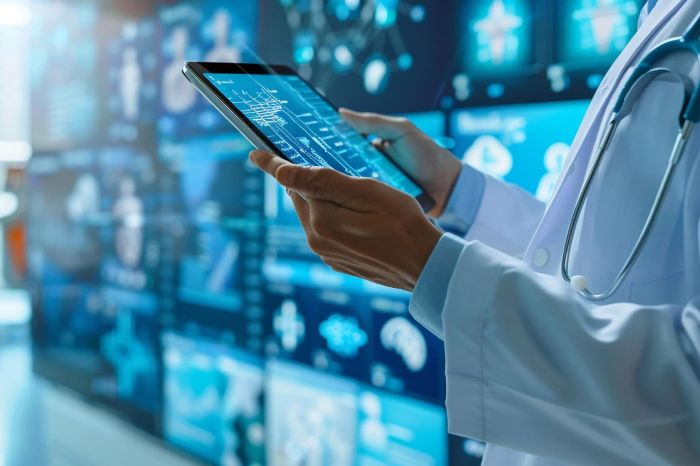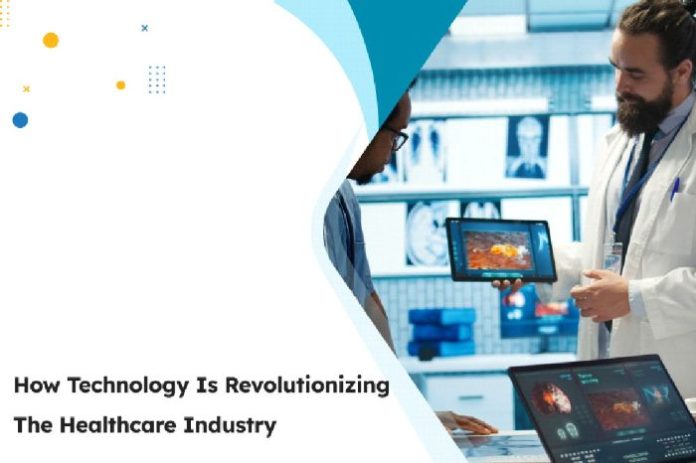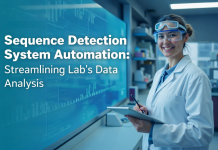The medical industry is being transformed by technology in revolutionary forms, with better care, more efficiency, and improved patient outcomes. Most evident is the convergence of digital technology and healthcare services. These digital technologies have streamlined processes, guaranteed communication, and enabled significant advances. Additionally, healthcare industry technologies of health trends like telemedicine, augmented wearables, and diagnostic-based AI are transforming patient care. These advances make care more efficient and individualized.
Besides this, hospital management systems and clinic management systems that are used in the healthcare industry are making it easy to manage resources, manage patient records, and coordinate departments with ease. The systems lower the risk of human mistakes and the cost of operation. As a result, they provide benefits to medical providers and patients.
Besides that, smart healthcare management is creating new preventive care paradigms. With the application of IoT sensor integration and real-time analysis, clinicians have the ability to track patients remotely. Thus, earlier diagnosis and management of chronic diseases are enabled.
Key Takeaways
- The healthcare industry benefits from technology, improving patient care, efficiency, and outcomes.
- Innovations like telemedicine, wearables, and AI enhance patient experiences and streamline healthcare processes.
- Hospital and clinic management systems reduce errors and costs while optimizing operations.
- AI and ML improve administrative tasks, diagnostics, and decision-making in healthcare settings.
- Telemedicine expands access to care, especially for rural and underserved populations.
Table of Contents
Technological Advancements in Healthcare
Healthcare industry technology development has transformed the care delivery by doctors, patient data management, and automated hospital functions. Among the most significant things to have come is medical billing software. It has made billing completed on a speedy basis and with increased speed and accuracy. Thus, it makes healthcare efficient. They are closely associated with EMR software (Electronic Medical Records) and EHR software (Electronic Health Records). Because of this connection, physicians can store patients’ records, preserve them, and manage them. With the computerization of patient records, the systems promote greater interaction between healthcare professionals. Furthermore, diagnosis and treatment are facilitated at a quicker rate.
Hospital Information Management Systems development has been a driving force in making hospital administration simpler, with the ability to track information in real-time and better resource, staff, and patient control. The systems help the hospitals in optimizing operations at lower cost and higher quality services. Moreover, these insights also support smarter decisions when it comes to staffing your clinic. As a result, the right personnel are available at the right time.
Apart from that, the development of medical apps has grown exponentially, particularly in countries like India. Indian Healthcare App Development Companies have a significant role to contribute to the creation of telemedicine, remote monitoring, and appointment scheduling apps. Not only are the apps offering increased access to healthcare, but also convenience to the patients. This is especially true for rural patients. The same is true for custom websites for the healthcare industry, built to meet strict compliance standards. These sites also help patients find the right information faster.
Generally, technology continues to revolutionize the healthcare sector by improving patients’ experiences and doctors’ productivity.

Artificial Intelligence and Machine Learning in Healthcare
Artificial Intelligence (AI) and Machine Learning (ML) are transforming healthcare at breakneck speed in terms of wiser decision-making, enhanced patient care, and enhanced organizational productivity. In healthcare facilities, hospital management software in India based on AI is helping to automate a number of administrative tasks. This includes tasks from patient registration to billing, with more accuracy and faster procedures. Consequently, the systems provide better resource utilization, optimal manpower utilization, and monitoring of patient information without a single hassle.
On the medical front, AI has even been integrated into clinic management software to help doctors schedule patient visits, keep track of medical history, and recommend custom treatments. Even pharmacy operations are being driven by AI through Pharmacy Management Systems and advanced genetic sequence analysis platforms, which ensure smooth dispensation of medicines, reduce errors, and automate inventory management.
AI and ML also play a major role in diagnostic sciences, particularly in laboratory management systems and radiology information systems. AI algorithms implemented in such systems assist in examining the patient samples, detecting abnormalities, and producing accurate reports much quicker than ever before. As a result, this facilitates viable decision-making by the health experts in real time.
To streamline IPD and OPD, AI-driven IPD and OPD management systems are increasing inpatient and outpatient department efficiency. Central Sterilizing Supply Department (CSSD) operations are also being optimized by utilizing AI in an attempt to optimize equipment supply and offer timely equipment sterilization. Furthermore, integrated EMR/EHR systems are also utilizing AI to forecast health trends. These systems warn of early disease detection and tailor patient treatment in a manner that enables healthcare to be proactive and efficient.
Telemedicine and Remote Patient Monitoring
Telemedicine and remote patient monitoring are revolutionizing healthcare by providing patients with cheap, affordable, and convenient treatment. Additionally, Telemedicine is facilitating patients to access healthcare professionals without ever having to see them. Physical contact is reduced, and accessibility to healthcare is enhanced, particularly for rural or underprivileged groups. This has been facilitated by advancements in Patient Relationship Management (PRM) systems, which allow healthcare professionals to track patient engagement, follow-ups, and ongoing communication, thus enhancing patient outcomes and satisfaction quality.
Apart from that, Patient Registration Systems have also been integrated into telemedicine platforms so that the patient would be able to register, schedule appointments, and update medical history at home. The systems minimize administrative work, and the process is streamlined and made efficient.
Hospital management software has also contributed importantly to the adoption of hospital management software by the healthcare industry through the ease of utilization of telemedicine services in conjunction with the rest of the healthcare system. Hospital management software offers tools of patient data controlling, calendars, and invoices, as well as healthcare compliance and regulations.
Apart from this, smart hospital management systems are complementing remote patient monitoring with the ability to collect real-time patient information from wearable sensors in a way that allows clinicians to monitor vital signs, monitor recovery, and respond accordingly. This use of technology results in proactive and actionable care provisioning.
The Rise of Digital Health Records and Data Analytics
The introduction of electronic health records has transformed the management of patient information by health care providers in terms of improving the quality and effectiveness of care. Physicians are able to store and recover patient information with relative ease in the application of health care management systems, making quick decisions and avoiding room for mistakes in paper-based records. This shift to computer systems has also been made easy through the application of medical billing software that allows easy billing, reduces the administrative burden, and ensures proper insurance claims.
Other than that, the latest generation of medical software has thrown in sophisticated analysis of data. Analyzing huge amounts of patient data, the systems provide valuable information in the form of trends, disease risk, and treatment success. Physicians can offer more tailored, evidence-based treatments and work proactively before problems are brought forward.
Technology is spearheading this revolution by not only enhancing record-keeping. It also anticipates patient needs, chronic disease management, and even the delivery of healthcare as a whole. With healthcare expanding its frontiers to newer and greener fields, the application of electronic health records and data analytics will be central, driving efficiencies and improvement in patient care.
Conclusion
In combination, technology is revolutionizing the healthcare industry by enhancing the treatment of patients, operationalizing processes, and enhancing access to treatment. Technologies like AI, telemedicine, electronic health records, and sophisticated healthcare software are enhancing access, efficiency, and tailoring of care. With increased innovation in the technologies, they can now proactively, evidence-based, and patient-centered create healthcare. Ultimately, technology is not only changing healthcare systems but also enabling providers and patients to improve health outcomes.











